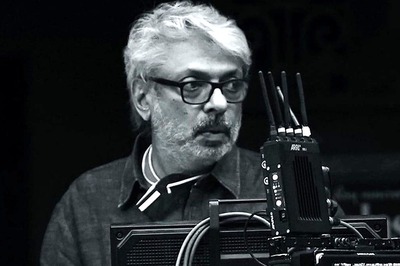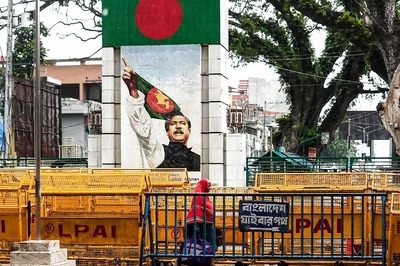
views
This year, on the occasion of Onam, the entire nation is in a contemplative and argumentative mood over the debate about corruption. Ironically, when King Mahabali, the legendary icon, in whose remembrance Onam is celebrated, ruled Kerala, there was no corruption. Mahabali was a king with a difference. There was happiness and prosperity in his kingdom, discrimination of any kind was unheard of, there was no sorrow or poverty or disease and contentment reigned supreme. And Onam commemorates this bygone era and the glorious reign of Mahabali. Whether such an era existed or not, legend says this king provided corruption-free governance. And this is something that people across the world, at all periods of time, have yearned for. During Mahabali’s time there was no crime and thieves and therefore, no need for people to lock their doors at night. His citizens were truthful, because they had no reason to deceive. Or loot. Also, they were people with high moral and ethical values and did not encourage corruption by paying bribes! Onam is an occasion for Keralites to rededicate their lives to stand up for such high moral and ethical values in life. This makes them a group of people who constantly fight against various injustices in society. I think Mahabali’s kingdom and its ethos have contributed much to modern Kerala and its political culture. The vibrant democracy of Kerala is a living example of the spirit and the urge for just & corruption-free governance. Eradicating corrupt practices is something that has to begin from our souls. Only with the total transformation of an individual can corruption be eradicated from society. But this can happen only at a time when our conscience starts ruling over us. Thus, Mahatma Gandhi wanted to listen to his inner voice or conscience in a spirit of love and compassion. His search for listening to the conscience was an attempt to purify and transform him. It was a spiritual exercise in search of truth. Similarly, Onam in that sense, is a spiritual exercise of a different kind, as far as I am concerned. Not many may agree with me. However, this is my experience. Onam, no doubt has got several aspects attached to it. In the modern era, it may be much commercialised, as more tourists come to the state during this period and people spend money excessively. Onam is also a food festival and other several related cultural extravaganzas are also part of Onam. However, the overriding spirit of Onam is the longing for the coming back of an era where there is no corruption, poverty, hunger and injustice. Onam’s political relevance is that citizens of modern Kerala get an opportunity to imagine and hope for a corruption-free government. Corruption-free governmental system catches their imagination every year and they celebrate that, which is their satyagraha, a hope for the coming back of a rule by Mahabali. As coming back of Mahabali could be a matter of doubt, so they rededicate themselves to live as ‘His’ citizens as the legend says ‘there was no corruption during his time’. So no scope for fake truth seekers as the country is witnessing now. In Kerala, people often protest and agitate against injustices or wrong policies etc. The source of their strength to protest against an injustice comes from their belief that they should fight for a good society. This is the result of the yearly practice of Onam, which is a satyagraha. People, deep from their hearts, long for a clean system and corruption-free government that Mahabali only can provide. Here people are united. Though it has some association with Hindu traditions, no longer it belongs to any particular religion. It is part of Kerala’s common culture. Mahabali is Kerala’s political symbol of spirituality and he is God who visits every year and purifies people’s hearts. That annual visit of Mahabali makes Kerala, God’s Own Country, keep a check on corruption and other vices. Onam celebrations generally last for ten days. It is the power that they gain through these ten days’ long spiritual exercise, done in unison with all communities, castes and ideological groups, that make Kerala immune from large-scale corruption that we see in some other parts of the country. Its political leaders are much poorer compared to their counterparts from other states. Kerala has a number of achievements in many areas, especially in the human and social development front. In the economic development front it is in a fast race with the rest of the country. In IT and tourism Kerala has already started moving very fast. It is emerging as a hot business hub of India. With satyagraha exercise, the ten-day Onam rituals, Mahabali would bless Kerala abundantly and in the next 10 years Kerala would be transformed to be a showpiece for the entire world in the emerging knowledge and green economy. Its achievements in economic front, as in the human & social development front, would be very unique. Mahatma Gandhi’s grandson said in the larger Indian context that, “ Bapu ( Gandhiji) would never have allowed corruption scenario to reach this level. He would have become active when the disease (corruption) was at a nascent stage and not when it has reached alarming proportions.” Yes only those who listen to the inner voice or conscience can be a satyagrahi. There is a difference between truth seeking and being an opportunist. But of late, Onam is taking a commercial shape, and its ethos is threatening to get buried in all the fanfare and ostentation that have come to be associated with it. Keralites should be alert to this danger and strive hard to keep alive the spiritual aspect of Onam in order to continue their mission of being true citizens of Mahabali kingdom. (The writer is Senior Economist, World Association for Small and Medium Enterprises. e-mail: [email protected], Mob.09953871432)


















Comments
0 comment